
“One day people will ask who lost Ukraine”: what Ukraine got from the NATO summit and what the Alliance is afraid of?
The NATO summit in Vilnius did not meet Ukraine's expectations: some say it was a good outcome, such as additional weapons and G7 security guarantees, while others criticise the leaders of the Alliance for their lack of courage and caution. Read our review to find out what Ukraine is bringing from Lithuania and what to expect next
MAP cancellation, long-range missiles, F-16 memorandum: promises from the first day of the NATO summit
On the first day of the NATO summit in Vilnius, the Allies were generous and promised to increase arms supplies to Ukraine. Thus, the Allies approved a support package that includes the cancellation of the Membership Action Plan (MAP) requirement, a long-term military assistance programme worth $500 million a year to help the Ukrainian army modernise and fully meet NATO standards. They also announced the launch of the NATO-Ukraine Council, a new body of interaction between Kyiv and the Alliance that will serve as a platform for consultations in crisis situations.
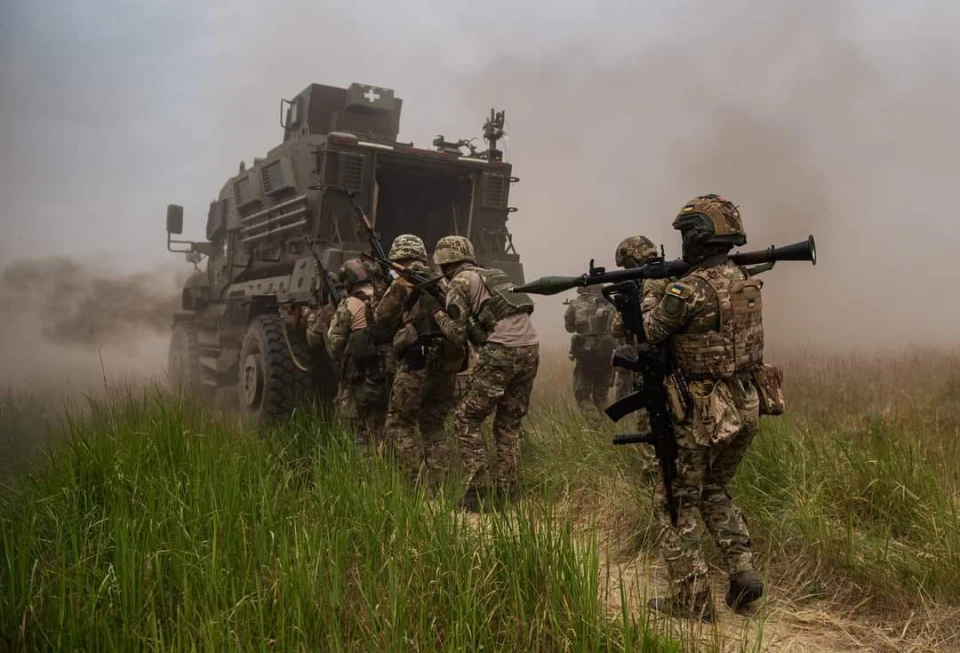
Photo credit: General Staff of the Armed Forces of Ukraine
French President Emmanuel Macron said that his country would provide Kyiv with long-range missiles to support the Ukrainian Armed Forces' counter-offensive. And Reuters reported that the first French long-range SCALP missiles are already in Ukraine. They will be launched from old Soviet combat aircraft within internationally recognised state borders. At the same time, France does not consider the supply of long-range cruise missiles to be an escalation, pointing to Russia's use of much longer-range missiles.
Germany has also announced additional assistance. German Chancellor Olaf Scholz and Defence Minister Boris Pistorius will present a new €700 million arms package for the Ukrainian Armed Forces at the NATO summit in Vilnius.
The package will include
- two Patriot air defence missile launchers from the Bundeswehr arsenal;
- 25 Leopard tanks (model not specified);
- 20,000 artillery shells;
- 40 Marder armoured personnel carriers.
Norway has increased the size of its military aid fund for Ukraine this year from 7.5 billion kroner ($717 million) to 10 billion kroner ($956 million). According to Norwegian Prime Minister Gahr Støre, Ukraine is in dire need of additional military support and materials.
On the first day of the Vilnius summit, Defence Minister Oleksii Reznikov signed a memorandum with 11 counterparts to create a coalition to train F-16 fighter pilots. The members of the coalition are Denmark, the Netherlands, Belgium, Canada, Luxembourg, Norway, Poland, Portugal, Romania, Sweden and the United Kingdom. Acting Danish Minister of Defence Troels Lund Poulsen said that the exercises are scheduled to begin in August, and the results could be seen in six months. The training centre will be set up in Romania. They plan to train two groups first - 10-12 pilots and support staff who will maintain the aircraft. In total, about 30-40 people.
Reuters wrote that NATO members Denmark and the Netherlands are leading an international effort to train pilots and support staff, maintain the aircraft, and ultimately ensure the delivery of F-16s to Ukraine. Polish Defence Minister Mariusz Blaszczak said that his country would provide the infrastructure for Ukrainians to train on the fighter jets. According to Ukraine’s Foreign Minister Dmytro Kuleba, F-16s are expected to appear in Ukrainian skies in the first quarter of 2024.
More weapons and security guarantees: gifts to Ukraine on the second day of the summit
On the second day of the meeting of NATO leaders, President Volodymyr Zelenskyy announced three priorities for Ukraine. These are new support packages for the Ukrainian Armed Forces on the battlefield, an invitation to join the Alliance, and security guarantees on the way. Kyiv wants to get a clear understanding that it has an invitation as soon as the security situation allows.
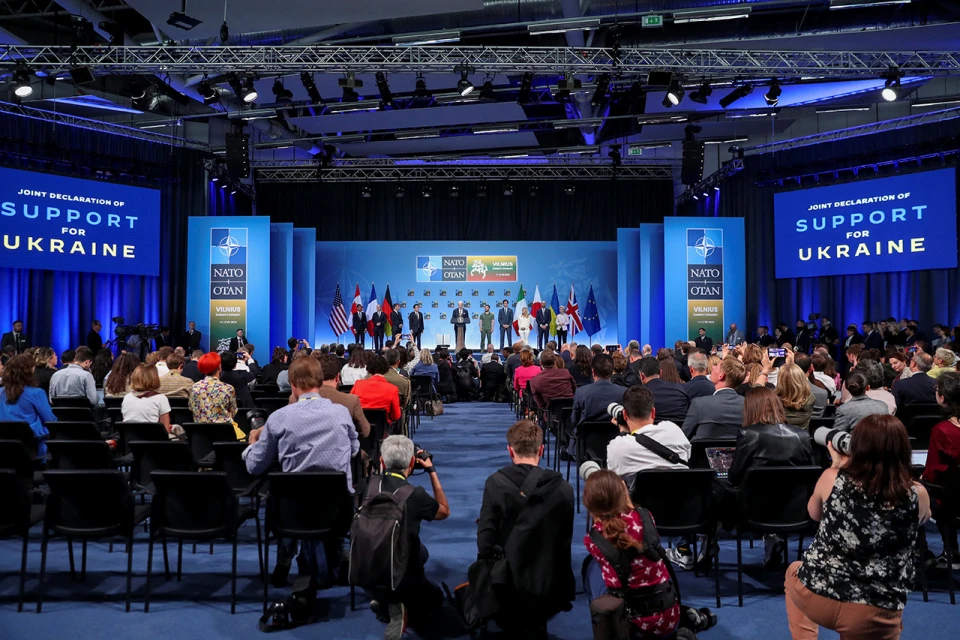
As CNN reported, Biden and NATO leaders unanimously approved a substantial aid package for Ukraine. Prior to the start of the NATO-Ukraine Council, Zelenskyy held bilateral meetings with leaders of several countries, who pledged additional assistance to Ukraine.
In particular, the United Kingdom, along with the G7 members, will provide a new aid package worth $65 million. It will include thousands of additional ammunition for Challenger 2, more than 70 combat and logistics vehicles.
Ukraine's Defence Ministry signed an agreement with the French Ministry of Defence under which Paris will increase military aid to Kyiv by €170 million. The process of procuring and supplying weapons to Ukraine will be simplified, and a base for joint production of spare parts and maintenance of foreign weapons and equipment will be created.
Ukraine also signed a joint agreement on cooperation in defence procurement with Sweden. According to Minister Oleksii Reznikov, the document opens up great opportunities for both the Ukrainian Armed Forces and Swedish companies such as SAAB and others. The countries also agreed to exchange and mutually protect classified information.
Norway will provide another 1,000 Black Hornet drones for reconnaissance. These drones are designed to be mounted on reconnaissance vehicles and can be automatically launched from their board, and have already successfully demonstrated results in Ukraine. Oslo will also provide two more NASAMS air defence systems and spare parts, as well as dry rations for the military.
After his meeting with Canadian Prime Minister Justin Trudeau, Zelenskyy noted that the country would help with armoured vehicles, that there were already strong agreements and that important security assistance for Ukraine was being prepared. Germany has promised to supply additional Patriot launchers and missiles for them.
Australia will provide Ukraine with a new defence package that will include 30 Bushmaster armoured personnel carriers. And Japan will supply drone detection systems.
Another important result of the Vilnius summit: the G7 countries agreed on a joint declaration of support for Ukraine and long-term security guarantees aimed at protecting it from future Russian aggression, but the agreements themselves have not yet been signed. Negotiations between Ukraine and each of the G7 countries will begin to formalise support for Ukraine through the defined security guarantees.
The document, in particular, outlines the commitment of the G7 member states to continue to provide "security assistance and modern military equipment on land, air and sea, with a priority on air defence, long-range artillery and long-range firepower, armoured vehicles and other key capabilities such as combat aircraft, and by promoting greater interoperability with Euro-Atlantic partners".
The declaration is open-ended, so other states can join the security assurances in addition to the G7 member states. This is the first document that symbolises the existence of ‘an umbrella’ in the form of security guarantees. They will be signed after Ukraine's victory in the war and will be valid until Ukraine joins the Alliance.
According to Biden, the G7 countries will help Ukraine develop its border defence on land, in the air and at sea, and provide the resources necessary to repel any aggression.
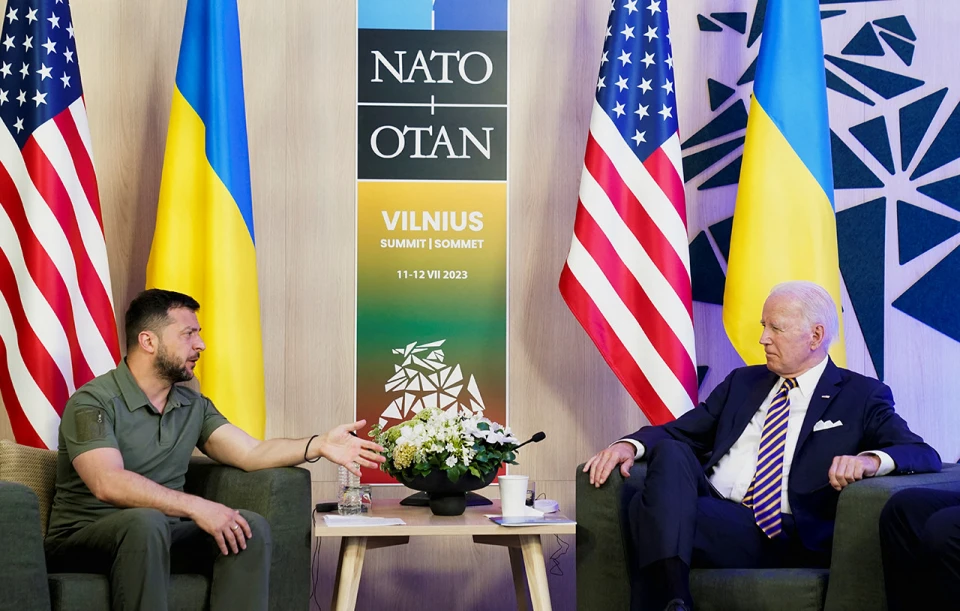
Biden and Zelenskyy meet at the NATO summit Photo: Reuters
Even before these security guarantees were agreed upon, Zelenskyy said that their adoption by the G7 would be a certain success. Ukraine understands that it cannot be a NATO member while there is a war going on. But clear signals that this will happen, according to the president, sounded confident at the summit.
In general, he called the results of the summit good, and stressed that if there were an invitation to NATO, they would be perfect. At the same time, NATO Secretary General Jens Stoltenberg said that Ukraine is now closer to NATO than ever, and the allies agreed that the country would become a member of the military-political bloc. But he stressed that Kyiv will receive the invitation after all members agree that all the conditions for accession are met.
What about Ukraine's accession and the conditions?
The Alliance promises to invite Ukraine into its family as soon as it fulfils all the conditions, but it is not yet clear what these conditions are and by whom they should be formulated. For example, the requirement to pass the Membership Action Plan (MAP) stage has been removed, and instead, a number of reforms are required, said White House National Security Advisor John Kirby. These include rooting out corruption, building democratic institutions, a strong judiciary, the rule of law and other key indicators that are required for any country seeking to become a NATO member. Kirby has previously noted that Ukraine's membership in NATO is unlikely in the near future, as it would involve the Alliance in a war with Russia.
As stated in the Bucharest Declaration, NATO remains Ukraine's future. US President Joe Biden supports the Alliance's open door policy, but his current focus will be on helping Ukraine.
However, according to media reports, the decision of the Vilnius NATO summit does not contain a list of conditions that Ukraine must fulfil, but a mechanism for their assessment. Instead of the MAP, the Annual National Programme (ANP) will become the instrument for identifying and monitoring the reforms necessary for accession. Ukraine already has this tool at its disposal. NATO foreign ministers will regularly assess progress using the adapted ANP, and only if it is completed will Ukraine be invited to join NATO.
Following the NATO summit's stance on Ukraine's membership, Foreign Minister Dmytro Kuleba expressed disappointment that Kyiv did not receive the invitation it wanted. He stressed that the Alliance should not keep "the whole situation and Ukraine in limbo when it comes to membership".
Kuleba acknowledged that the decisions of the Vilnius summit made Kyiv's path to the Alliance shorter, but not faster. "Yes, Kyiv's membership in the Alliance is an inevitable historical process. The only question is that some people want it to happen in many years, while Ukrainians want it to happen much faster,” he said.
"Everyone understands, and our partners understand, that the strongest, most powerful guarantee that there will be no more war in Europe is Ukraine's membership in the Alliance. All other security guarantees are good. But nothing can replace NATO membership," he said.
On the first day of the NATO summit, President Volodymyr Zelenskyy was also outraged by the results. The Guardian wrote that when he arrived in Vilnius on Tuesday, he tried to persuade NATO allies to rewrite the final communiqué of the summit.
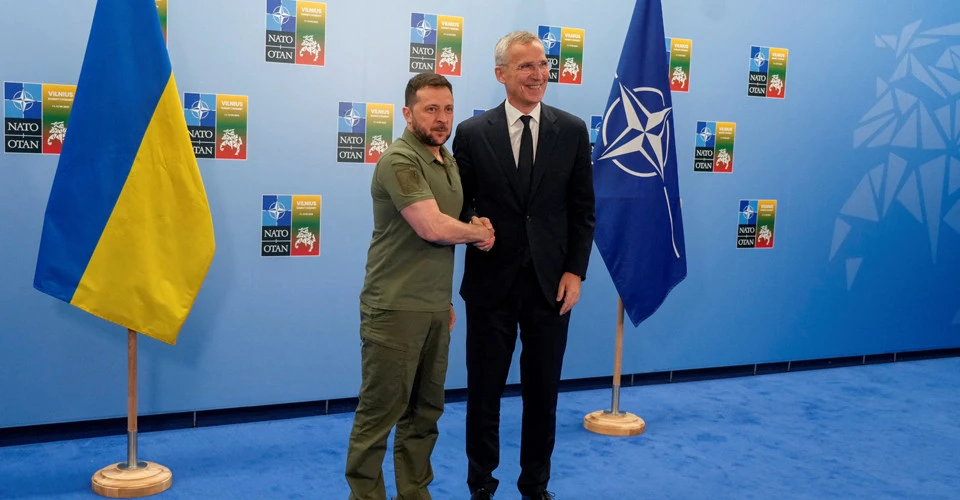
Volodymyr Zelenskyy and Jens Stoltenberg Photo: Reuters
At the same time, Jens Stoltenberg said that the Alliance had made its strongest decision yet on Ukraine's path to membership, knowing full well that Moscow would protest. "We will never allow Moscow to decide who can and cannot be a member of the Alliance," the NATO chief added.
Estonian Prime Minister Kaja Kallas assured that she understood Ukraine's disappointment with the decisions of the Vilnius NATO summit, but stressed that the Alliance takes this issue "very seriously". And at the moment, "this is as much as we can offer at the moment". The same opinion was expressed by Finnish President Sauli Niinistö.
British Defence Secretary Ben Wallace said that Ukraine should join NATO "as soon as possible", but only after the Russian invasion is "over". However, he also called on Ukraine to be more grateful to its partners for their military support instead of constantly demanding new weapons. “The UK is not an Amazon service for delivering weapons to Ukraine,” Wallace added. Ukrainians should remember that they need to convince some dubious politicians in Washington and other capitals that the tens of billions of dollars spent on military assistance to Ukraine in its war with Russia are worth it, he added.
German Defence Minister Boris Pistorius said that the inflow of investments to Ukraine would begin only after the war and accession to the Alliance. He also stressed that his country supports Kyiv's accession to NATO, but according to media reports, it is Germany that is blocking Ukraine's invitation to join the Alliance. The main obstacle is the personal position of Chancellor Olaf Scholz, while US President Biden's position is softer.
Despite the excuses given by NATO leaders as to why Ukraine cannot be invited to join now, British analyst Timothy Ash believes that it is the United States that should be the boldest leader at the Vilnius NATO summit regarding Ukraine's long-term security. Otherwise, historians may one day ask: "Who lost Ukraine?". And their stunning answer may be: "President Joe Biden".
The Alliance explained the lack of a clear plan for the timing of Ukraine's accession by the dynamics of the war, while Paul Ronzheimer, deputy editor-in-chief of BILD, called this behaviour of the Alliance a mockery of Ukrainian soldiers who are now fighting the Russian aggressor. "Heads of state are sitting in safety in Vilnius, and from there they send a message to all Ukrainian soldiers in trenches that they are not yet modern enough for NATO. How much do the soldiers have to feel mocked?" he said.
Such caution on the part of the Alliance and fears of being drawn into a war may embolden Moscow, the Financial Times writes. It would be better to send an invitation now, which would allow Kyiv to join shortly after the current war ends. Zelenskyy called this a motivation for Russia to continue its terror. In addition, US caution about Kyiv's membership in NATO hints at the limits of America's willingness to continue to guarantee security in Europe, so countries on the continent should dramatically increase their defence spending and take on more responsibility for the defence of Europe.
The outcome of the NATO summit in Vilnius is evidence of the West's pragmatic approach, which is still afraid to adopt the Peace Formula, which provides clear signals to both Ukraine and Russia when Ukrainians become NATO members, said Serhiy Zgurets, director of the information and consulting company Defense Express.
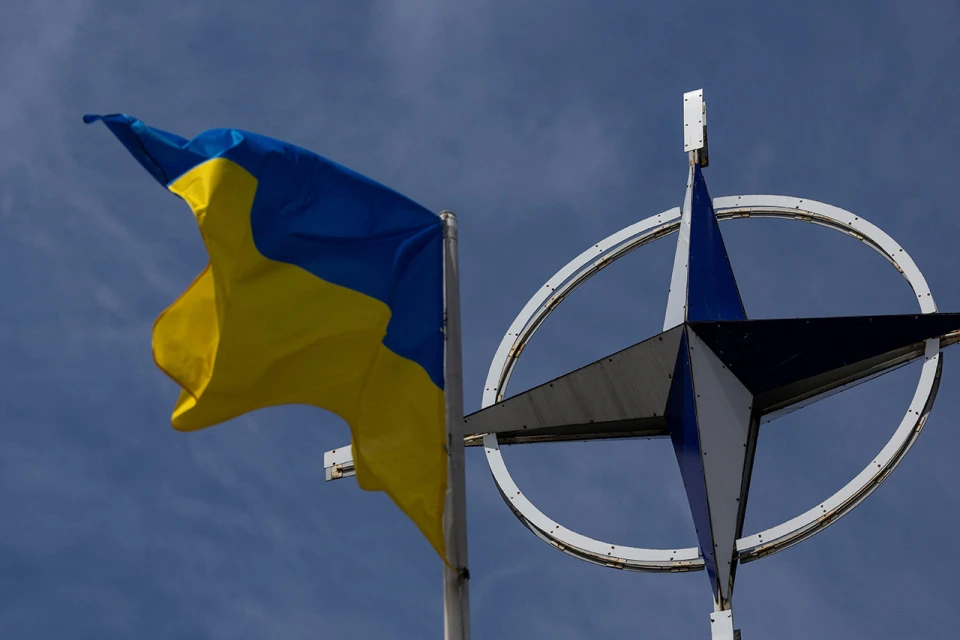
NATO, the national flag of Ukraine Photo: Reuters
The situation regarding the expectations of the Vilnius summit and Ukraine's accession to NATO was aptly summed up by American journalist Michael Weiss. As he wrote on Twitter, it will never cease to amuse him that there are people who insist NATO is an instrument of US hegemony when the US is almost alone among NATO allies in slow-walking (if not denying) membership to the one country doing what NATO was founded to do.
NATO Secretary General Jens Stoltenberg did assure that Ukraine will become a member of the Alliance, and the agreements reached in Vilnius will be reviewed after the war with Russia ends.
To sum up, we quote from The Hill, which notes that although Ukraine did not receive a clear path to NATO membership at the Vilnius summit, Ukrainians are already looking forward to the next summit in 2024 in Washington. And the pressure on Biden to finally get this issue right will only increase.
by Yulia Osym
- News













































